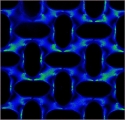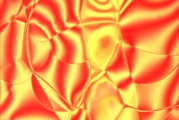Welcome
The Nonlinear Dynamics Group provides a lively interdisciplinary research environment with a strong track record in publication and collaboration.
Our research is primarily concerned with experimental and theoretical studies of the physics of fluid flows and liquid crystals, i.e. the properties of isotropic and anisotropic fluids. The length scales range from the microscopic, where the focus is on self-assembly and order, to macroscopic nonlinear effects such as chaos, turbulence and pattern formation. The experimental work is closely linked with theory through the Manchester Centre for Nonlinear Dynamics, which provides a vibrant research environment.
Current topics of research include:
- Transitions to turbulence and chaos in pipe flows
- Complexity and clustering in particulate flows
- Pattern formation and stress transmission in granular materials
- Bifurcations and instabilities in nonlinear elasticity
- Transient Dynamics in rotating flows
- Structures and order in chiral liquid crystals
- Electro-optic effects in liquid crystals
- Optical properties of self-assembled systems
- Sensors
- Laser manipulation in liquid crystals
- Polymer and nanotube liquid crystal composites
- Phase ordering and fractal structures
- Functional ordering in cell membranes
- Optics of photoreceptor and novel visual pigments
For more information about the group please view the Overview section.
For an introduction to Nonlinear and Liquid Crystal Physics please visit Nonlinear Physics at Manchester and Liquid Crystals



Positions
Postgraduate positions available starting October 2008. For more details on how to apply please click here.
Currently there are no Academic or Research Staff positions available.

Seminars
Full semester programme announced. Please click here for more details .
For a list of past seminars and speakers please click here.

Manchester Centre for Nonlinear Dynamics (MCND)
The MCND is an initiative taken by the University of Manchester to promote inter-disciplinary research of nonlinear systems.
The centre is formed by researchers from within the School of Mathematics and the School of Physics and Astronomy. The MCND laboratories are housed within the School of Physics and Astronomy.